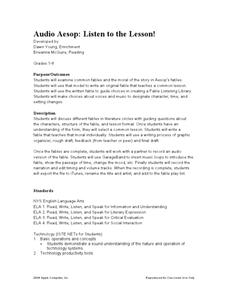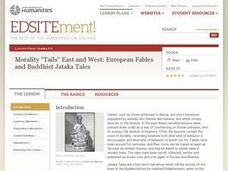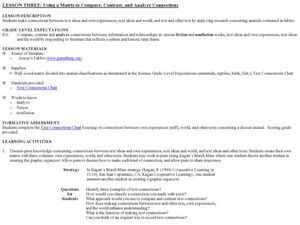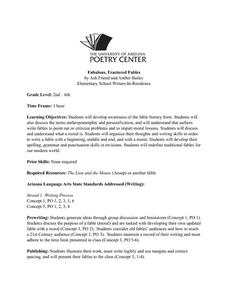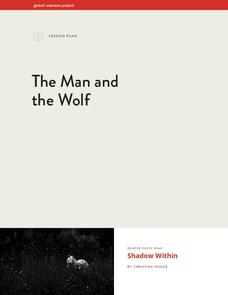Curated OER
Audio Aesop: Listen to the Lesson!
Aesop's Fables are the focus of this language arts instructional activity. Young philosophers study and discuss the morals found in the most famous of Aesop's Fables. They write an original fable that teaches a common moral. A "Fable...
Curated OER
Aesop's Fables
Examine the fables of Aesop with your class. Pupils identify the morals of fables and role-play a scene from their favorite fable of Aesop. Additionally, they compose letters to a favorite character in the fable. Learners role-play again...
Curated OER
The Coin and the Fable: Alaska quarter reverse
An Alaskan quarter and a book of fables is what you'll need to start this lesson. Learners will use the image of the bear and the salmon found on the reverse side of the Alaskan quarter as inspiration. They will compose a fable about the...
Curated OER
Writing Skills: Fables
Use fables as a fun way for English Language Learners to gain confidence and fluency in their reading and speaking skills. After reading a fable in class, they retell their story to a group of their peers. When this jigsaw activity is...
Curated OER
Writing Fables
Students write their own fables. In this writing fables lesson, students use handheld computers to write a fable. The class designs a spreadsheet to organize common elements of fables. Students also edit each others' work.
Curated OER
Morality "Tails" East and West: European Fables and Buddhist Jataka Tales
Have your class explore Buddhist Jataka Tales to compare and contrast them to European fables. After defining fables, Jataka tales, and the elements of each, learners identify themes and patterns for both types of narratives and the...
Curated OER
Fables and Trickster Tales Around the World
Young scholars analyze fables and trickster tales from various cultural traditions. In this fable analysis lesson, students identify the elements of fables and trickster stories. Young scholars read Aesop's fables and Ananse spider...
Curated OER
Using a Matrix to Compare, Contrast, and Analyze Connections
Young scholars explore writing techniques by comparing fiction vs. non-fiction. In this literature analysis lesson, students read stories from Aesop's Fables and compare the themes and characters to stories from their own life. Young...
Curated OER
Fabulous, Fractured Fables
Elementary schoolers develop an awareness of the literary form known as the fable. They explore how authors write fables to pass along moral lessons. After reading and discussing many famous fables embedded in the plan, learners attempt...
NWT Literacy Council
Readers Theatre Scripts
Engage and entertain young learners with this collection of readers theatre activities. With over 25 different scripts, a wide range of topics are covered from simple counting and rhyming exercises to adaptions of popular children's...
Curated OER
Acting Like a Bunch of Animals: Fables and Human
The video "The Tales of Aesop" traces for viewers the history of fables and identifies their characteristics. The class then goes to the web site "The Fisherman and the Little Fish" where they examine the classic and a modern version of...
Global Oneness Project
The Man and the Wolf
Human attitudes toward the big bad wolf come into focus in a photo essay that asks viewers to consider their own feelings about the endangered species.
Curated OER
Worksheet 2/7 on Nouns
In this adding nouns to sentences worksheet, students use nouns in a word bank to fill in the missing nouns and complete the passage, "Tortoise of the Galapagos Islands". Students add 31 nouns.


